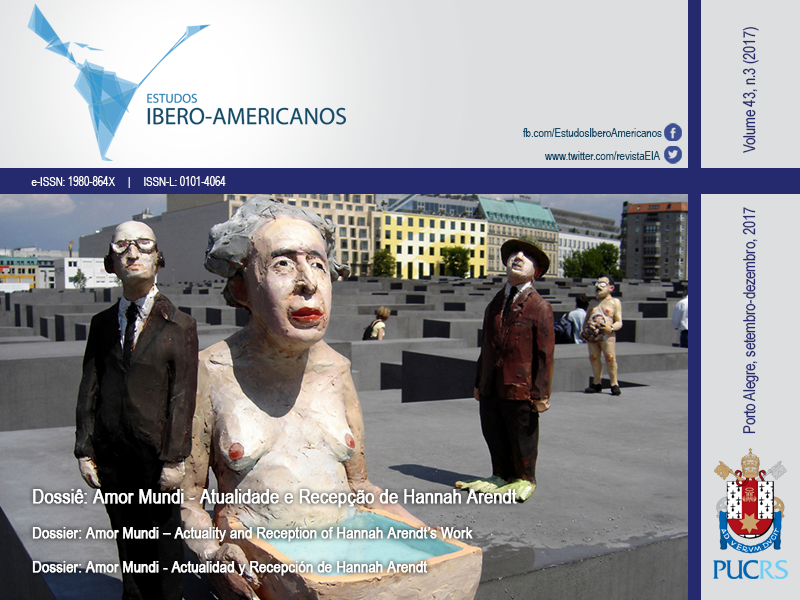The Power of Judging – or how to distinguish ‘indifference’ in Kant and Arendt. Some critical notes on the structure of activities
DOI:
https://doi.org/10.15448/1980-864X.2017.3.26140Keywords:
Judgement, Judging, Indifference, Arendt, Kant.Abstract
One of the most horrific scenarios in ethics – more than immorality or amorality – is moral indifference. Arendt’s final work, The Life of the Mind, shows a different facet of ‘indifference’ and sees it as a vital component of judgement and reflection. The following article addresses this understanding of indifference. Arendt draws from Immanuel Kant’s Third Critique, where emotion and experience are considered constitutive, in contrast to the two earlier Critiques, the first of which deals with the logical function of judging and the second, with moral judgement. In this respect – the Arendtian background to judging that belongs to aesthetics rather than ethics – it is the freedom of aesthetic judgement that guarantees its ethical potential. In Arendt’s work, judgement is the undisputed basis of her thinking. In addition to Kant’s two conventional types of judgement – determinative and reflective – he presents a third way of judging in his Critique of the Faculty of Judgement. Only this third, subjective reflective aesthetic judgement (subjektiv “ästhetisch-reflektierendes Urteil” (KANT, 1974, p. 57; KANT, 2007, p. 169) has the potential for what Kant himself calls the ‘rehabilitation of emotion’. Further analysis of this third type of judging would demonstrate that here Kant combines a form of indifference and the idea of prototype judging, giving indifference a positive aspect. And only this third form constitutes the basis for Arendt’s general thoughts on udging. The range of types of judgement in Kant’s thinking could in fact be interpreted not only as three differents ways of thinking, which he refers to with the term Denkungsart, but rather as three different ways of understanding the world. It is thus of particular interest o Arendt in terms of what she calls “worldlineness”. The diversity of judging worked out in Kant’s Third Critique is an
existential expression of the human ability for what is known as ‘Haltung’ in the German language and in every other language
only translates fragmentarily into ‘posture’, ‘habit’ or ‘attitude’. It is not simply the ability to adopt a certain ‘Haltung’, but
also to change it.
Downloads
References
ARENDT, Hannah. The Life of the Mind. One/Thinking. Two/ Willing. One-volume Edition. San Diego/New York/London: A Harvest Book, Harcourt Brace & Company, 1978 (1971).
ARENDT, Hannah. Vom Leben des Geistes. Das Denken. Das Wollen. Ed. by Mary McCarthy. München/Zurich: Piper, 1998.
BEINER, Roland. Essay: Hannah Arendt über das Urteilen. In: ARENDT, Hannah. Urteilen. Texte zu Kants Politischer Philosophie. Ed. by Ronald Beiner. München: Piper, 1998 (1985).
HERMENAU, Frank. Urteilskraft als politisches Vermögen. Zu Hannah Arendts Theorie der Urteilskraft. Kritische Studien zu Klampen. Lüneburg zu Klampen: VERLAG, 1999. Vol. 13.
HEUER, Wolfgang; ROSENMÜLLER, Stefanie; HEITER, Bernd (Ed.). Hannah Arendt-Handbuch. Lebe-Werk-Wirkung. Stuttgart/Weimar: Metzler, 2011.
HESSBRÜGGEN-WALTER, Stefan; KURBACHER, Frauke A. Self-criticism as a Way of Life. In: MCDOWELL, John. Reason and Nature. Lecture and Colloquium in Münster 1999. Ed. by Marcus Willaschek. Münster: Lit-Verlag, 2000. p. 59-67.
JASPERS, Karl. Psychologie der Weltanschauungen. München: Piper, 1985 (1919).
KANT, Immanuel. Kritik der Urteilskraft. Edited by Wilhelm Weischedel. Frankfurt a.M.: Suhrkamp, 1974.
______. Oxford World’s Classics: Immanuel Kants: Critique of Judgement. Translated by James Creed Meredith. Revised, edited,
and introduced by Nicholas Walker. Oxford: Oxford University Press, 2007 (1952).
______. Passion und Reflexion – Zur Philosophie des Philosophen. In: Aufklärung als praktische Philosophie. Ed. by Friedrich Vollhardt and Frank Grunert. Tübingen: Niemeyer, 1998. p. 253-268.
______. Urteilskraft als Prototyp. Kritische Überlegungen im Anschluß an Kants ästhetisch-reflektierende Urteilskraft. In: RODI,
Frithjof (ed.). Urteilskraft und Heuristik in den Wissenschaften. Beiträge zur Entstehung des Neuen. Weilerswist, Velbrück: 2003. p. 185-195.
KURBACHER, Frauke A. Selbstverhältnis und Weltbezug. Urteilskraft in existenz-hermeneutischer Perspektive. Hildesheim/
Zürich/New York: Olms, 2005.
______. Liebe zum Sein als Liebe zum Leben. In: Arendt, Hannah. Der Liebesbegriff bei Augustin. Versuch einer philosophischen Interpretation. Reprint 1929. Edited, and introduced by Frauke A. Kurbacher, translated by Kirsten Groß-Albenhausen with indices by Christine Albrecht. Hildesheim/Zürich/New York: Olms, 2006. p. XI-XLVI.
______. Hannah Arendt: Das Spätwerk – The Life of the Mind/ Vom Leben des Geistes – Das Denken and Das Wollen. In: HEUER, Wolfgang; ROSENMÜLLER, Stefanie; HEITER, Bernd (Ed.). Hannah Arendt-Handbuch. Leben-Werk-Wirkung. Stuttgart/Weimar: Metzler, 2011. p. 124-132.
______. Zwischen Personen. Eine Philosophie der Haltung. Würzburg: Königshausen & Neumann, 2017 (forthcoming). MERLEAU-PONTY, Maurice. Phénoménologie de la Perception. Paris: Gallimard, 1945.
______. Phänomenologie der Wahrnehmung. Berlin: de Gruyter,
(1966).
SCHILLER, Friedrich. Über die ästhetische Erziehung des Menschen. Stuttgart: Reclam, 2000.
VOLK, Christian. Urteilen in dunklen Zeiten. Eine neue Lesart von Hannah Arendts ‘Banalität des Bösen’. Berlin: Lukas, 2005.
VOLLRATH, Ernst. Die Rekonstruktion der politischen Urteilskraft. Stuttgart: Ernst Klett, 1977.
WALCH, Johann Georg. Gedancken vom Philosophischen Naturell. Reprint of 1723. Ed. by Frauke A. Kurbacher. Hildesheim/Zürich/
New York: Olms, 2000.
ZENKER, Kay. Denkfreiheit. Libertas philosophandi in der deutschen Aufklärung. Hamburg: Meiner, 2012.
Downloads
Published
How to Cite
Issue
Section
License
Copyright (c) 2017 Frauke Kurbacher

This work is licensed under a Creative Commons Attribution 4.0 International License.
Copyright
The submission of originals to Estudos Ibero-Americanos implies the transfer by the authors of the right for publication. Authors retain copyright and grant the journal right of first publication. If the authors wish to include the same data into another publication, they must cite Estudos Ibero-Americanos as the site of original publication.
Creative Commons License
Except where otherwise specified, material published in this journal is licensed under a Creative Commons Attribution 4.0 International license, which allows unrestricted use, distribution and reproduction in any medium, provided the original publication is correctly cited.






